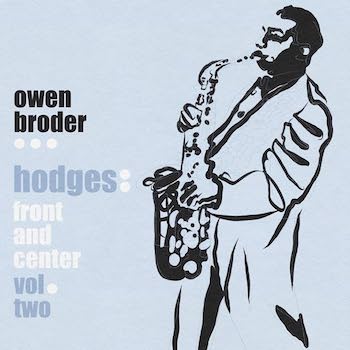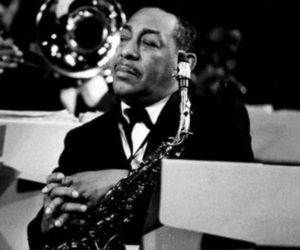Jazz Album Review: Owen Broder’s “Hodges: Front and Center, Vol. 2” — A Vibrant Homage
By Con Chapman
Saxophonist Owen Broder’s efforts to keep Johnny Hodges’s music alive is more than just mere imitation. It is a fitting tribute to a musician who deserves to be listened to more.
 “There are no second acts in American life,” Scott Fitzgerald wrote in The Last Tycoon, and the prediction has been used to characterize the prospects for many professions. For example, “sophomore slump” is used in baseball to describe the rookie who disappoints in his second season.
“There are no second acts in American life,” Scott Fitzgerald wrote in The Last Tycoon, and the prediction has been used to characterize the prospects for many professions. For example, “sophomore slump” is used in baseball to describe the rookie who disappoints in his second season.
Owen Broder’s Johnny Hodges: Front and Center, Vol. 2 is an exception to this rule, perhaps because the fine musicians heard on volume 1 of his tribute to Johnny Hodges (Broder on saxes, Riley Mulherkar trumpet, Carmen Staaf piano, Barry Stephenson III bass, and Bryan Carter drums) have been assembled two years later for another go.
In his time, Hodges was ranked as one of the top two alto saxophonists, ahead of Charlie Parker until audiences accepted the revolutionary changes Bird had wrought. Besides Broder’s discs, albums paying tribute to Hodges are few (Bobby Watson, Herb Geller, Phil Woods), while Bird’s acolytes are legion. The reason is that Hodges, unlike the peripatetic Parker, stayed in one place for most of his career; he joined Duke Ellington in 1928 and would remain in his employ for 38 years, a long time in the notoriously inconstant world of jazz groups. Accordingly, he was viewed by many as a subordinate member of another man’s band rather than a solo artist, a characterization that Hodges resented.
Front and Center, Vol. 2 collects eight numbers that Hodges played over the course of his career, either with Ellington or on his own. For those who aren’t familiar with either musician, the recording serves as a nice introduction to both.
“Big Smack” is a composition by Hodges and Ben Webster, an Ellington bandmate who modeled his style on Hodges: “That’s what I tried to do,” Webster said, “play Johnny on tenor.” The “smack” of the title is not, as one might infer, slang for heroin; neither Webster nor Hodges succumbed to the drug that was the occupational hazard of jazzmen. Their mutual intoxicant of choice was alcohol, which Webster sometimes imbibed to excess, but which Hodges (almost) always kept under control. Their 1960 version of this tune lay unreleased in Norman Granz’s vaults for many decades. Here it supplies a workout opportunity for Broder and Mulherkar, with a pleasing bass solo by Stephenson and a drum solo by Carter of the best kind, one that complements the number as a whole, swinging from start to finish rather than dragging it down.

Saxophonist Owen Broder. Photo: Adrien H Tillmann
“Stompy Jones” is a tribute to Richard Jones, a busboy at the Cotton Club, where the Ellington orchestra performed off and on from 1927 to 1938. “Jonesy,” as he was called, hit the road with the band when they left the club in 1931 and became the band’s valet. The tune was recorded by the Ellington band in 1934 with a boxy rhythm; the version that Hodges recorded with a small group a quarter century later, which the Broder group replicates here, is looser. Paradoxically, it packs a bigger punch than its performance via a full orchestra.
“Wabash Blues” is perhaps the supreme test of the album. Hodges’s intro and opening bars on the original are so exemplary of his genius; hot and cool at the same time, he transformed a rather stiff vaudeville number into a searing statement that represents his small group work at its best, aided by Count Basie ringers Jo Jones (drums) and Harry Edison (trumpet). Here Bryan Carter’s stickwork on the snare rim compares favorably with that of Jones — no small accomplishment.
“Used to Be Duke” is a Hodges composition from the period when he was on a four-year hiatus from the Ellington orchestra. Hodges went out on his own in 1951, lured by producer Norman Granz’s promise that he could make more money as a solo act. He went into the studio in the summer of 1954 with his combo (which included John Coltrane for a time), and recorded this number, which signaled his determination to separate himself from Ellington. The title carries a subtext of defensiveness, and Hodges would later confess that he wasn’t up to the task of being a “front man” for a band. “Too many headaches,” he would say of the hassles of everyday management — travel, money, bookings — that Ellington was able to delegate to others.

Saxophonist Johnny Hodges. Photo: Wiki Commons
Two of the songs on the Broder album — “Shady Side” and “Back Beat”– are taken from a 1959 Hodges collaboration with baritone saxophonist Gerry Mulligan. It is difficult to imagine two cats more laid back than Hodges and Mulligan, and the music on that album — Gerry Mulligan Meets Johnny Hodges — is the sort of cool, head-nodding music that has all but disappeared from the jazz repertoire. On both, Broder takes Mulligan’s part on baritone sax, with Mulherkar’s trumpet providing the alto voice.
“The Star Crossed Lovers” was the product of Ellington’s self-cannibalization; under pressure to generate music for a 1956 Shakespeare festival, he told Billy Strayhorn to steal from “Pretty Little Girl,” which he had composed two years before. To borrow a line from the Bard’s Juliet, the song by either name smells as sweet, and here Broder and company give it a sensitive treatment, with Staaf’s piano setting forth the theme as she complements the others.
The other song on the album is the chestnut “St. Louis Blues,” which Ellington and Hodges recorded for their Back to Back album in 1958. Ellington was modest about his accomplishments on the keyboard, saying he was a “rehearsal piano player.” It is precise to say that he was always a composer at the piano, picking out themes for others to pursue rather than highlighting himself. The full emotional depth of the W.C. Handy classic is plumbed by Broder et al., with Staaf echoing Ellington’s trademark use of dissonances to upset expectations.
It would be impossible to replicate Hodges’s sound exactly: “No one has a tone like that,” said pianist Jess Stacy. “He took it to the grave with him.” Broder’s efforts to keep Hodges’s music alive is more than just mere imitation, however. It is a fitting tribute to a musician who deserves to be listened to more.
Con Chapman is the author of Rabbit’s Blues: The Life and Music of Johnny Hodges, winner of the 2019 Book of the Year Award by Hot Club de France.
Tagged: Bryan Carter, Carmen Staaf, Johnny Hodges, Johnny Hodges: Front and Center Vol. 2, Owen Broder


Jazz must be truly dead!
Might as well add that Smack was the nickname of the revered bandleader Fletcher Henderson.